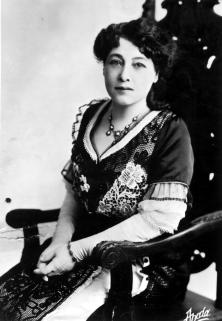Description du film :
« Un documentaire qui réhabilite la mémoire de la première femme cinéaste au monde, morte oubliée de tous, au New Jersey, en 1968, à l'âge de 95 ans. Le film reconstitue l'univers de cette femme remarquable grâce à des entrevues réalisées par les télévisions européennes autour des années 60, des extraits de ses films, des archives familiales, des témoignages de personnes qui l'ont connue, d'universitaires et d'historiens du cinéma. »
-- Office national du film du Canada
(source)
Description du film [en anglais] :
« Alice Guy-Blaché was a filmmaker before the word even existed. She made her first film at the end of the last century, when cinema was still a newborn. After directing, producing and/or writing more than 700 films, she slipped into oblivion. The Lost Garden rescues the story of one of cinema's most fearless pioneers. By 1910, married and with her first baby, she founded her own production company in America. Solax became the biggest pre-Hollywood studio on the continent. But at 49, she lost her husband, her company and her illusions. The Lost Garden looks at the life and times of a woman who, with two words, changed the art of screen acting forever. 'Be natural,' she used to tell her actors. Television interviews from the sixties reveal Guy-Blaché to be witty, articulate and elegant. Her films are cleverly edited to illustrate the events occurring in her personal life. Granddaughter Adrienne and daughter-in-law Roberta offer photographs and press clippings from her private albums, while film historians point out the artistry and innovativeness of her work. The Lost Garden eulogizes a woman whom history tried hard to forget. Alice Guy-Blaché makes it back to the screen in time for cinema's one hundredth anniversary. »
-- National Film Board of Canada
(source)
|


